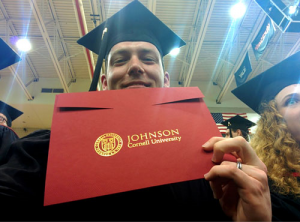Tales from a Graduate
March 19th, 2015Originally Posted:Â 6/12/2014 9:18 AMÂ Â
I believe there are probably enough posts about how great an MBA is, how many friends people made, how the experience changed a life, or how it might be the best two years of your life. For my part, I can say all of that is true, but I thought it might be interesting to close my time blogging by saying some of the things which surprised me.
To incoming first-years:
1)     MBA recruiting is its own beast; no matter how well you think you prepared to apply to school, or how polished you were for your job before it, you need to be trained in the ways of MBA recruiting. Pay attention to your club leadership and you’ll be fine.
2)     Your courses, immersion, clubs, and most other things don’t matter all that much for interviews. Don’t get me wrong: they are table stakes and they matter for success in your internship. The thing is that you’ll only have taken core courses and attended club meetings by the time you interview. You won’t have had job-specific classes nor done any club leadership roles. Hopefully this reinforces point #1 about MBA recruiting being its own beast.
3)     It is surprising just how much change you can impart on the school in the relatively short time you’re part of the student body. With the whole school turning over every 2 years the only thing known is what one class learns from the class above them. If you teach the class below you something else, you’ve just changed the way things are done going forward.
4)     There are lots of great places to study outside of Sage (you are at an Ivy after all). It might suck when you can’t find a room in Sage, but there are amazing buildings within a 5 minute walk. Go find them instead of being frustrated with the lack of a room.
To returning 2nd year students:
1)     Where did all the free food go? Seriously. First year students don’t know how good they have it.
2)     Your default question, when you don’t know what else to say, changes by semester of business school:
- Semester 1: What are you hoping to do?
- Semester 2: Where are you going for the summer?
- Semester 3: Where are you going full time?
- Semester 4: When are you leaving?
3)     It is very difficult to stay involved. I found that it wasn’t because I didn’t care (far from it) but that you’re just not at Sage as often. That means all of the stuff that goes on becomes an extra trip into school rather than another meeting where you’re just moving from breakout room to breakout room.
4)     There are lots of ‘last events’ and you’re never sure which one is actually the one where you won’t see somebody again for a very long time, if ever.
5)     Johnson’s graduation is better coordinated than any other program I talked to. For as smart as we are, it sure is nice the administration makes it so we don’t have to think on our big day.
The End; The Beginning
I’ll close by saying thank-you. Thanks to Peter Krakow for trusting me with a platform for my thoughts. Thanks to my classmates for supporting me and reading my posts. Thanks to the many readers who attended Johnson previously. Thanks to those readers who may (or may not) attend Johnson in the future. It’s been my pleasure to share my journey with you.
What a great 2 years. Time to move on and tackle whatever comes next.
Part of a series of my re-postings of my blog for the “Life @ Johnson†section of the Samuel Curtis Johnson Graduate School of Management at Cornell University MBA program website.
